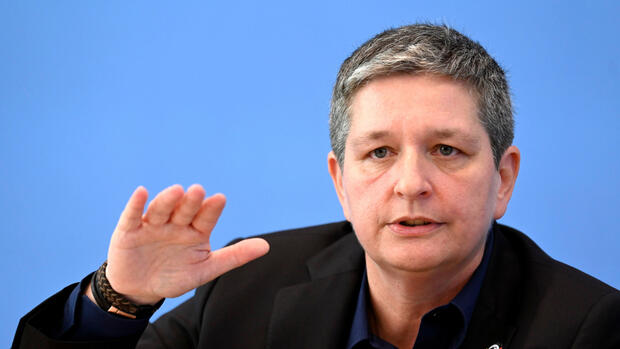Berlin Only a few days in office and already in alarm mode. Claudia Plattner is the new head of the Federal Office for Information Security (BSI). The 49-year-old is taking over the management of the highest cyber security authority at a time when the level of threats in cyberspace is higher than ever.
“The threat situation is growing, and if it were easy, then everything would have been solved,” said Plattner on Friday when she was presented as the new agency president at the federal press conference in Berlin. The qualified mathematician still has “no ready-made answers” ready, but the results are sobering.
Federal Minister of the Interior Nancy Faeser speaks of a “turning point for internal security”. “There is considerable potential for escalation as a result of Putin’s warfare,” said the SPD politician. That is why cyber security has the highest priority. The goals are “higher resilience and powerful security”.
Faeser describes the biggest challenge for the new head of the authorities. And she makes no secret of the fact that, for her, Plattner, as an “outstanding international IT security expert with extensive management experience”, is the best choice for the task. The FDP domestic politician Manuel Höferlin agrees.
Plattner is the first woman to head the BSI
“The risk situation in the digital space is higher than ever before, which is why Germany’s IT security urgently needs to be structurally rebuilt,” he said. Plattner is an “excellent choice” for this due to her professional qualifications.
Plattner is the first woman to head the BSI based in Bonn. She succeeds Arne Schönbohm. Faeser dismissed the long-standing BSI President last October.
Jan Böhmermann had previously reported on his ZDF program about Schönbohm’s contacts with an association that is controversial because of the connections of some members to Russia.
Schönbohm put up a fight. He is now President of the Federal Academy for Public Administration and is also responsible for modernizing the training landscape.
>> Read also: How Nancy Faeser fired BSI President Arne Schönbohm
Plattner studied mathematics at the Technical University of Darmstadt and at Tulane University in New Orleans, Louisiana. After that, she made a career in business. She worked for PPA GmbH, a service specialist for financial analysis in companies, for nine years.
In 2013 she moved to DB Cargo and from there in 2015 to the IT service provider of the railway group, DB Systel. There, Plattner was responsible for modernizing the IT of Deutsche Bahn.
Most recently, Plattner was Director General of the IT department of the European Central Bank (ECB). It was thus responsible for the internal IT systems of the central bank and the euro system, to which the Bundesbank and the other 19 national central banks are connected. Cyber security and the control of all digitization processes as well as other strategic issues fell within her area of responsibility.
ECB colleagues valued Plattner as an open-minded and nice person to talk to, as the central bank’s Handelsblatt learned. Now she is looking forward to her new position. She takes on her new role “with great respect,” she said. “The task of improving the IT security situation in Germany and advancing digitization with certainty is complex and urgent.” This applies all the more with a view to the current crisis situation.
BSI boss Plattner: “Just holding your hands up is not enough”
According to the latest BSI situation report, an average of 34,000 e-mails containing malware are intercepted in government networks in Germany every month. The security authorities are particularly concerned about criminals who have turned hacking into a business model. These include so-called ransomware attacks on computer systems with encryption Trojans with the aim of extorting ransom.
In order to be better armed against threats, Plattner’s authority should be given more powers to protect against cyber attacks. “In our cybersecurity agenda, we have clearly identified the priorities that we are pursuing together,” said Faeser. According to the plan, the BSI is to be expanded to become the central office in the relationship between the federal and state governments and will provide more support to the states in the area of cyber security in the future.
The German security authorities are concerned that pro-Russian activists, cybercriminals and hacker groups from the Russian secret services are forming an alliance to attack Western systems. Recently, websites of authorities and other important institutions have been paralyzed again and again.
>> Read also: Huawei-Components – Home Office has evidence of security issues
China is also in focus, for example when it comes to protecting critical infrastructure in Germany. “This includes protecting our communication channels and networks,” said Faeser. For this reason, all Chinese components installed in the 5G mobile network are currently being checked very carefully. “We will ban components if there are serious safety risks,” emphasized the minister.
Plattner also believes it is essential that the critical infrastructure in particular is better protected. The new BSI President calls for ways to “stop and fend off” attacks. “Just holding your hands up is not enough,” said Plattner, who officially took office on July 1. She now wants to tackle the challenges. That takes time, but above all, as she emphasizes: “Conviction, energy, drive, talent, knowledge – and confidence that we will succeed.”
More: Which ministries are already using AI – in surprisingly concrete projects


